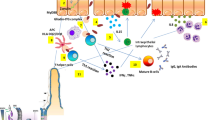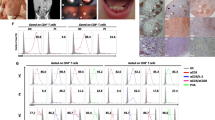Abstract
Celiac disease (CD) is characterized by intolerance to gluten and high risk of developing autoimmune phenomena. Possible defects in immune tolerance could have a role in the pathogenesis of the disease. As regulatory T-cells (Tregs) are the main population involved in maintaining peripheral tolerance, we investigated the number of these cells in celiac patients as compared with healthy donors. Moreover, we analyzed the suppressive function of CD4+CD25+ T-cells from celiac disease patients and controls on autologous responder T-cells (CD4+CD25−). The percentage of CD4+CD25+FOXP3+ cells was not different in celiacs and in healthy controls, and among positive cells the level of expression of the two regulatory markers was comparable. However, the suppressor activity of Tregs was significantly impaired in CD patients. These results suggest that a defect in Tregs function could play a role in the pathogenesis of CD and in CD-associated autoimmunity.





Similar content being viewed by others
References
Schuppan D. Current concepts of celiac disease pathogenesis. Gastroenterology. 2000;119:234–242. doi:10.1053/gast.2000.8521.
Auricchio S, Troncone R, Maurano F. Coeliac disease in the year 2000. Ital J Gastroenterol Hepatol. 1999;31:773–780.
Green PH, Cellier C. Celiac disease. N Engl J Med. 2007;357:1731–1743. doi:10.1056/NEJMra071600.
Green FH, Carty JE. Letter: coeliac disease and autoimmunity. Lancet. 1976;1:964. doi:10.1016/S0140-6736(76)92742-2.
Collin P, Maki M. Associated disorders in coeliac disease: clinical aspects. Scand J Gastroenterol. 1994;29:769–775. doi:10.3109/00365529409092508.
Ventura A, Magazzu G, Greco L. Duration of exposure to gluten and risk for autoimmune disorders in patients with celiac disease. Sigep study group for autoimmune disorders in celiac disease. Gastroenterology. 1999;117:297–303. doi:10.1053/gast.1999.0029900297.
Not T, Tommasini A, Tonini G, et al. Undiagnosed coeliac disease and risk of autoimmune disorders in subjects with type i diabetes mellitus. Diabetologia. 2001;44:151–155. doi:10.1007/s001250051593.
Barker JM. Clinical review: type 1 diabetes-associated autoimmunity: natural history, genetic associations, and screening. J Clin Endocrinol Metab. 2006;91:1210–1217. doi:10.1210/jc.2005-1679.
Aaltonen J, Björses P, Perheentupa J, et al. An autoimmune disease, apeced, caused by mutations in a novel gene featuring two phd-type zinc-finger domains. Nat Genet. 1997;17:399–403. doi:10.1038/ng1297-399.
Anderson MS, Venanzi ES, Klein L, et al. Projection of an immunological self shadow within the thymus by the aire protein. Science. 2002;298:1395–1401. doi:10.1126/science.1075958.
Bennett CL, Christie J, Ramsdell F, et al. The immune dysregulation, polyendocrinopathy, enteropathy, x-linked syndrome (ipex) is caused by mutations of foxp3. Nat Genet. 2001;27:20–21. doi:10.1038/83713.
Wildin RS, Ramsdell F, Peake J, et al. X-linked neonatal diabetes mellitus, enteropathy and endocrinopathy syndrome is the human equivalent of mouse scurfy. Nat Genet. 2001;27:18–20. doi:10.1038/83707.
Kriegel MA, Lohmann T, Gabler C, Blank N, Kalden JR, Lorenz HM. Defective suppressor function of human cd4+cd25+ regulatory t cells in autoimmune polyglandular syndrome type ii. J Exp Med. 2004;199:1285–1291. doi:10.1084/jem.20032158.
Baecher-Allan C, Viglietta V, Hafler DA. Inhibition of human cd4(+)cd25(+high) regulatory t cell function. J Immunol. 2002;169:6210–6217.
Lindley S, Dayan CM, Bishop A, Roep BO, Peakman M, Tree TI. Defective suppressor function in cd4(+)cd25(+) t-cells from patients with type 1 diabetes. Diabetes. 2005;54:92–99. doi:10.2337/diabetes.54.1.92.
Brusko T, Atkinson M. Treg in type 1 diabetes. Cell Biochem Biophys. 2007;48:165–175. doi:10.1007/s12013-007-0018-5.
Venken K, Hellings N, Thewissen M, Somers V, Hensen K, Rummens JL, et al. Compromised cd4(+) cd25(high) regulatory t-cell function in patients with relapsing-remitting multiple sclerosis is correlated with a reduced frequency of foxp3-positive cells and reduced foxp3 expression at the single-cell level. Immunology. 2008;123(1):79–89.
Gianfrani C, Levings MK, Sartirana C, et al. Gliadin-specific type 1 regulatory t cells from the intestinal mucosa of treated celiac patients inhibit pathogenic t cells. J Immunol. 2006;177:4178–4186.
Sakaguchi S, Sakaguchi N, Asano M, Itoh M, Toda M. Immunologic self-tolerance maintained by activated t cells expressing il-2 receptor alpha-chains (cd25). Breakdown of a single mechanism of self-tolerance causes various autoimmune diseases. J Immunol. 1995;155:1151–1164.
Marie JC, Letterio JJ, Gavin M, Rudensky AY. Tgf-beta1 maintains suppressor function and foxp3 expression in cd4+cd25+ regulatory t cells. J Exp Med. 2005;201:1061–1067. doi:10.1084/jem.20042276.
Ramsdell F. Foxp3 and natural regulatory t cells: key to a cell lineage? Immunity. 2003;19:165–168. doi:10.1016/S1074-7613(03)00207-3.
Tiittanen M, Westerholm-Ormio M, Verkasalo M, Savilahti E, Vaarala O. Infiltration of forkhead box p3-expressing cells in small intestinal mucosa in coeliac disease but not in type 1 diabetes. Clin Exp Immunol. 2008;152:498–507.
Wan YY, Flavell RA. Identifying foxp3-expressing suppressor t cells with a bicistronic reporter. Proc Natl Acad Sci USA. 2005;102:5126–5131. doi:10.1073/pnas.0501701102.
Allan SE, Crome SQ, Crellin NK, et al. Activation-induced foxp3 in human t effector cells does not suppress proliferation or cytokine production. Int Immunol. 2007;19:345–354. doi:10.1093/intimm/dxm014.
van Heel DA, Hunt K, Greco L, Wijmenga C. Genetics in coeliac disease. Best Pract Res Clin Gastroenterol. 2005;19:323–339. doi:10.1016/j.bpg.2005.01.001.
Abdulahad WH, Stegeman CA, van der Geld YM, Doornbos-van der Meer B, Limburg PC, Kallenberg CG. Functional defect of circulating regulatory cd4+ t cells in patients with wegener’s granulomatosis in remission. Arthritis Rheum. 2007;56:2080–2091. doi:10.1002/art.22692.
Author information
Authors and Affiliations
Corresponding author
Rights and permissions
About this article
Cite this article
Granzotto, M., dal Bo, S., Quaglia, S. et al. Regulatory T-Cell Function Is Impaired in Celiac Disease. Dig Dis Sci 54, 1513–1519 (2009). https://doi.org/10.1007/s10620-008-0501-x
Received:
Accepted:
Published:
Issue Date:
DOI: https://doi.org/10.1007/s10620-008-0501-x




